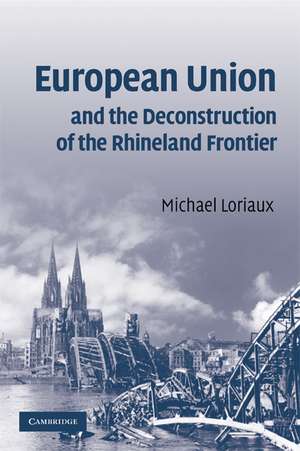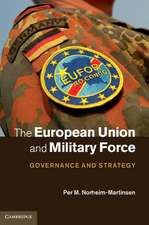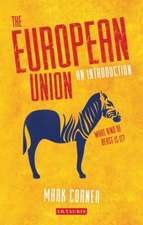European Union and the Deconstruction of the Rhineland Frontier
Autor Michael Loriauxen Limba Engleză Paperback – 10 sep 2008
Preț: 243.53 lei
Nou
Puncte Express: 365
Preț estimativ în valută:
46.60€ • 50.61$ • 39.15£
46.60€ • 50.61$ • 39.15£
Carte tipărită la comandă
Livrare economică 22 aprilie-06 mai
Preluare comenzi: 021 569.72.76
Specificații
ISBN-13: 9780521707077
ISBN-10: 0521707072
Pagini: 350
Ilustrații: 9 b/w illus. 41 maps 2 tables
Dimensiuni: 153 x 228 x 22 mm
Greutate: 0.57 kg
Ediția:1
Editura: Cambridge University Press
Colecția Cambridge University Press
Locul publicării:Cambridge, United Kingdom
ISBN-10: 0521707072
Pagini: 350
Ilustrații: 9 b/w illus. 41 maps 2 tables
Dimensiuni: 153 x 228 x 22 mm
Greutate: 0.57 kg
Ediția:1
Editura: Cambridge University Press
Colecția Cambridge University Press
Locul publicării:Cambridge, United Kingdom
Cuprins
1. Myth and geopolitics of the Rhineland frontier; 2. Trans Rhenum incolunt: the inauguration of the Rhineland frontier; 3. A 'principality of priests': the inauguration of Europe; 4. Anonymity and prosperity; 5. The great antecedent cracking; 6. Coups de force: Ossian and the département; 7. Wacht am Rhein: the Ossianic fracture of Rhineland space; 8. Carolingian discourse and Rhineland pacification; 9. Spatial representation and the political imagination.
Recenzii
'European Union and the Deconstruction of the Rhineland Frontier is nothing short of a reinterpretation of European history since pre-Roman times. It is a work of tremendous thought and scholarship, involving research in at least four languages, that gives us an entirely new way to think about national and European identity. This book is not only brilliant, it is path-breaking, and likely to be a landmark in its field.' Harvey B. Feigenbaum, The George Washington University
'Loriaux not only draws on the works of political geographers, international political economists, international relations specialists and historians, but integrates their insights in an approach that takes culture seriously. Challenging, interesting and illuminating.' Friedrich Kratochwil, European University Institute
'Drawing on Derrida and his notion that texts function as coups de force, Loriaux deconstructs a handful of discursive coups over two thousand years of history – Caesar's The Gallic Wars (1st c. BC), The Donation of Constantine (8th c.), the so-called works of Ossian (1760s), and a French constitutional decree dividing revolutionary France into departments – to show how these coups fractured and melded mental space in the Rhenish heart of Europe, prompted the development of the modern state and nurtured the national idea, reordered land use and commercial practice, impoverished and enriched communities, and finally made the map of Europe seem natural and inevitable. Loriaux tells this story with stunning control over his source material and unfaltering fluency. The book has a compelling narrative drive – as they say so often about pot-boilers, it's a page turner. A radically original interpretation of Franco-German history, seen from the banks of a great river system, this book is not potboiler but a Bildungsroman.' Nicholas G. Onuf, Florida International University
'Michael Loriaux has written a concise, well-judged and most useful analysis of the history, political economy, and 'space' of the Rhineland frontier. It is really rare to find such a wonderful conjunction of history, geography and theory between two covers. His deeply informed and novel conception of this critically placed place and space will be essential reading for anyone wanting to understand the formation and contemporary significance of the European Union.' Bruce Cumings, University of Chicago
'Readers who want to explore the EU's linguistic struggle to legitimate itself with reference to the European past will find this book intelligent and informative.' The Journal of Central European History
'Loriaux not only draws on the works of political geographers, international political economists, international relations specialists and historians, but integrates their insights in an approach that takes culture seriously. Challenging, interesting and illuminating.' Friedrich Kratochwil, European University Institute
'Drawing on Derrida and his notion that texts function as coups de force, Loriaux deconstructs a handful of discursive coups over two thousand years of history – Caesar's The Gallic Wars (1st c. BC), The Donation of Constantine (8th c.), the so-called works of Ossian (1760s), and a French constitutional decree dividing revolutionary France into departments – to show how these coups fractured and melded mental space in the Rhenish heart of Europe, prompted the development of the modern state and nurtured the national idea, reordered land use and commercial practice, impoverished and enriched communities, and finally made the map of Europe seem natural and inevitable. Loriaux tells this story with stunning control over his source material and unfaltering fluency. The book has a compelling narrative drive – as they say so often about pot-boilers, it's a page turner. A radically original interpretation of Franco-German history, seen from the banks of a great river system, this book is not potboiler but a Bildungsroman.' Nicholas G. Onuf, Florida International University
'Michael Loriaux has written a concise, well-judged and most useful analysis of the history, political economy, and 'space' of the Rhineland frontier. It is really rare to find such a wonderful conjunction of history, geography and theory between two covers. His deeply informed and novel conception of this critically placed place and space will be essential reading for anyone wanting to understand the formation and contemporary significance of the European Union.' Bruce Cumings, University of Chicago
'Readers who want to explore the EU's linguistic struggle to legitimate itself with reference to the European past will find this book intelligent and informative.' The Journal of Central European History
Notă biografică
Descriere
Examines problems posed by the history of the Rhineland region and its effects upon the foundation of the European Union.















